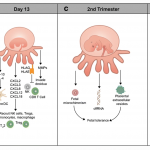Preferential inhibition of adaptive immune systemdynamics by glucocorticoids in patients after acutesurgical trauma
Edward A. Ganio, Natalie Stanley, Viktoria Lindberg-Larsen, Jakob Einhaus, Amy S. Tsai, Franck Verdonk, Anthony Culos, Sajjad Gahemi, Kristen K. Rumer, Ina A. Stelzer, Dyani Gaudilliere, Eileen Tsai, Ramin Fallahzadeh, Benjamin Choisy, Henrik Kehlet,Nima Aghaeepour, Martin S. Angst, Brice Gaudilliere
Glucocorticoids (GC) are a controversial yet commonly used intervention in the clinicalmanagement of acute inflammatory conditions, including sepsis or traumatic injury. In thecontext of major trauma such as surgery, concerns have been raised regarding adverseeffects from GC, thereby necessitating a better understanding of how GCs modulate theimmune response. Here we report the results of a randomized controlled trial(NCT02542592) in which we employ a high-dimensional mass cytometry approach tocharacterize innate and adaptive cell signaling dynamics after a major surgery (primaryoutcome) in patients treated with placebo or methylprednisolone (MP). A robust, unsu-pervised bootstrap clustering of immune cell subsets coupled with random forest analysisshows profound (AUC=0.92, p-value=3.16E-8) MP-induced alterations of immune cellsignaling trajectories, particularly in the adaptive compartments. By contrast, key innatesignaling responses previously associated with pain and functional recovery after surgery,including STAT3 and CREB phosphorylation, are not affected by MP. These results imply cell-specific and pathway-specific effects of GCs, and also prompt future studies to examine GCs’effects on clinical outcomes likely dependent on functional adaptive immune responses.


![Preferential inhibition of adaptive immune system dynamics by glucocorticoids in patients after acute surgical trauma [Nature Communications] Preferential inhibition of adaptive immune system dynamics by glucocorticoids in patients after acute surgical trauma [Nature Communications]](https://gaudillierelab.stanford.edu/wp-content/uploads/bfi_thumb/dummy-transparent-rg1ol0n2cad5bkcnaqzey9k3rm6x7898hz6uxu0h4c.png)

